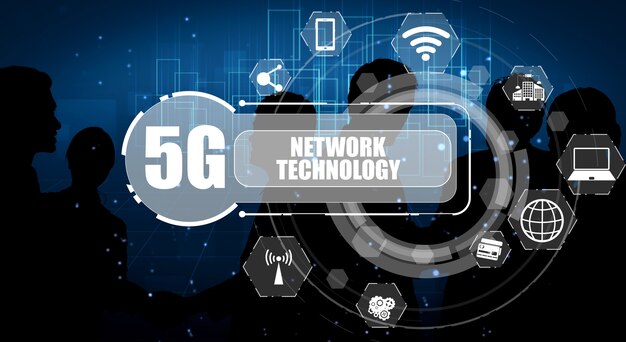The advent of 5G technology is widely recognized as a transformative force, set to revolutionize multiple sectors worldwide. With its promise of faster speeds, reduced latency, and increased connectivity, 5G is poised to reshape industries across the board—from healthcare to entertainment, manufacturing to transportation. By unlocking new possibilities and enabling innovations that were previously unimaginable, 5G is setting the stage for a more connected and efficient future. In this article, we explore how 5G is making waves across various sectors and what the future may hold.
The Promise of 5G Technology
5G, or fifth-generation wireless technology, is the latest evolution in mobile networks. Compared to its predecessors, 5G promises significantly faster data transmission speeds, lower latency (the time it takes for a data packet to travel from one point to another), and greater network capacity. This enables the seamless connection of millions of devices, from smartphones to smart cities and autonomous vehicles, and facilitates a higher quality of services in various industries.
While 5G’s most publicized impact is often associated with smartphones, the true potential lies in how it will influence sectors like healthcare, manufacturing, and entertainment. Let’s take a deeper dive into some of the key industries that will experience radical transformations due to 5G.
Healthcare: Revolutionizing Patient Care and Medical Operations
The healthcare industry stands to benefit immensely from the capabilities of 5G. One of the biggest advantages lies in its ability to support real-time remote monitoring, diagnosis, and treatment. With 5G, doctors can perform remote surgeries through robotic systems with near-zero latency, while wearable devices can provide continuous health data to caregivers in real time.
Moreover, 5G’s enhanced speed and connectivity will enable the seamless sharing of large medical data, such as high-resolution images and genetic data, facilitating quicker and more accurate diagnoses. AI-powered applications and telemedicine platforms will become more efficient and accessible, expanding healthcare access to underserved and remote populations.
Manufacturing: Enabling Smart Factories and Automation
In manufacturing, 5G will unlock new levels of automation and efficiency. The advent of “smart factories” is one of the most anticipated impacts of 5G, where machines and robots communicate with each other, make decisions autonomously, and optimize production lines in real time. With 5G’s low latency and ultra-reliable connectivity, manufacturers can improve productivity, reduce downtime, and ensure more consistent quality control.
Additionally, augmented reality (AR) and virtual reality (VR) are set to play a major role in the industry. Workers can use AR glasses, connected via 5G, to access real-time instructions and guidance while performing complex tasks, reducing errors and improving safety. Predictive maintenance will also become more effective, as 5G allows for continuous monitoring of equipment health, minimizing the risk of unplanned breakdowns.
Transportation: Powering Autonomous Vehicles and Smart Cities
Autonomous vehicles (AVs) are often considered one of the most exciting potential applications of 5G. The low latency of 5G enables AVs to communicate with each other and their environment in real time, making them safer and more reliable. Vehicles will be able to share information about traffic conditions, hazards, and road changes instantly, leading to better traffic management and reduced accidents.
In addition, 5G will empower smart city infrastructure, allowing traffic lights, parking meters, and public services to communicate efficiently. This will help reduce congestion, optimize resource usage, and improve overall urban living conditions.
Entertainment: Creating Immersive Experiences and Streaming Content
The entertainment industry, particularly in gaming and media, is undergoing a transformation thanks to 5G. With its high-speed data transfer and minimal latency, 5G will enable the delivery of ultra-high-definition (UHD) and 3D content for streaming. Whether it’s streaming 4K movies or playing cloud-based games in real time, 5G will provide seamless, high-quality experiences for consumers.
For the gaming industry, 5G will allow cloud gaming platforms to thrive, enabling gamers to play console-quality games on mobile devices without the need for expensive hardware. Additionally, augmented and virtual reality experiences, including live events and immersive entertainment, will become more interactive and accessible due to 5G’s power.
Other Industries: Retail, Education, and Beyond
In retail, 5G will allow for more personalized shopping experiences with the help of AR. For instance, customers can use their phones to visualize products in their homes or receive personalized recommendations based on real-time data.
In education, 5G will facilitate more immersive learning experiences with virtual and augmented reality, allowing students to interact with their lessons in innovative ways, even from remote locations.
FAQs About 5G Technology
- What is 5G? 5G is the fifth generation of mobile network technology, offering faster speeds, lower latency, and greater network capacity compared to previous generations.
- How does 5G differ from 4G? 5G offers faster data speeds, lower latency, and better connectivity for a larger number of devices compared to 4G, enabling more advanced applications like autonomous vehicles and smart cities.
- What are the key benefits of 5G? The key benefits include faster data transfer, reduced latency, increased connectivity, improved reliability, and enabling new technologies such as autonomous vehicles, smart factories, and advanced healthcare solutions.
- Will 5G replace Wi-Fi? While 5G will complement Wi-Fi, it is not likely to replace it. Both technologies will coexist, with Wi-Fi being better suited for indoor use and 5G being optimal for outdoor and mobile connectivity.
- When will 5G be widely available? 5G is already being rolled out in many regions worldwide, and widespread availability is expected over the next few years, particularly in urban areas.
- Can 5G impact global industries? Yes, 5G is set to transform industries such as healthcare, entertainment, transportation, manufacturing, and retail by enabling new technologies and improving efficiencies.
- Is 5G safe? Extensive research has shown that 5G is safe for human health, as it uses non-ionizing radiofrequency (RF) energy, similar to 4G and Wi-Fi, which has not been shown to cause harm at typical exposure levels.
Conclusion
5G technology is more than just an upgrade to the mobile network; it is a powerful enabler of digital transformation across industries. From healthcare to entertainment, manufacturing to transportation, 5G is unlocking new opportunities for innovation and improving efficiency, productivity, and customer experiences. As the technology continues to roll out globally, industries will increasingly harness its potential to create smarter, more connected ecosystems.
Key Takeaways:
- 5G is revolutionizing industries with faster speeds, lower latency, and higher connectivity.
- Healthcare, manufacturing, and transportation are among the sectors poised to benefit most from 5G.
- Entertainment and other sectors, including retail and education, will see innovative changes due to 5G’s capabilities.
- The widespread adoption of 5G will lead to smarter cities, more efficient industries, and improved services for consumers.

